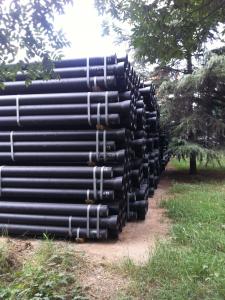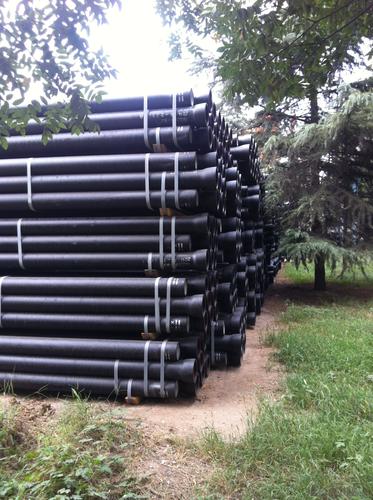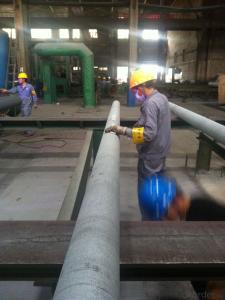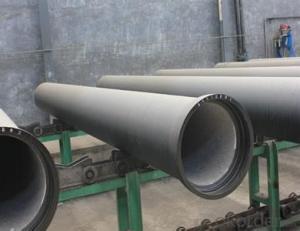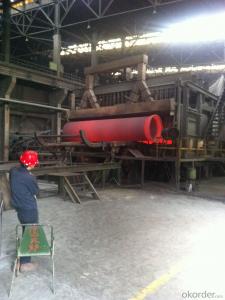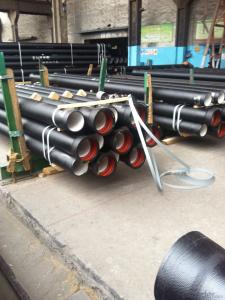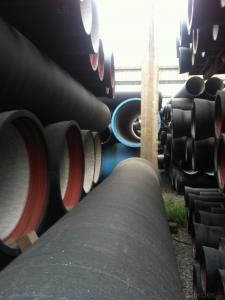DUCTILE IRON PIPE AND PIPE FITTINGS K7 CLASS DN100
- Loading Port:
- Tianjin
- Payment Terms:
- TT OR LC
- Min Order Qty:
- 23 pc
- Supply Capability:
- 3000 pc/month
OKorder Service Pledge
OKorder Financial Service
You Might Also Like
· Material : Ductile Cast Iron
· Size Range : DN 80mm to DN 2000mm
· Unit Effective Length : 6m or 5.7m
· Manufacture Standard: ISO 2531:1998/ EN 545:2006/EN 598:2007
· Annual capacity : 200,000 tons
· Coating Exterior: Zinc 130g/m2 according to ISO 8179-1 and bitumen coating 70 microns.
· Cement Interior: Portland Cement/ High Alumina Cement/ Sulphate Resisting Cement Lining according to ISO 4179
· Special requirements on external coating and internal lining can be applied
· We also provide accessories such as SBR/EPDM rubber gaskets, lubricant paste, pipe caps, PE sleeves, etc.
Additional Parts:
Each pipe is strictly inspected according to related standard to ensure permanently high performance.
Easy Installation at site and service free for life
Long Service Lifespan
Quotation will arrive you within 24hours once we get your inquiry.
We guarantee offering you a competitive price.
A copy of original inspection reports of pipes will be offered after shipment.
Photos of loading process will be sent to the customer after shipment effect.
We will follow-up the delivery progress after shipment effect and update to the customer on weekly basis.
- Q: Why is the sound speed of nodular cast iron lowered after heat treatment?
- Sound travels faster in a solid than it does in a liquidOr so, after heating, the intermolecular repulsion decreases, so that the same potential energy conduction requires molecules to move more distances, making the transmission slower
- Q: Are ductile iron pipes resistant to hydrostatic pressure?
- Yes, ductile iron pipes are resistant to hydrostatic pressure. They have the ability to withstand high water pressure without deforming or bursting, making them a reliable choice for applications involving the transportation of water and other fluids.
- Q: Does centrifugal cast iron pipe work well with lining cement? Will it scale and breed bacteria?
- The situation in use abroad seems. It is considered that the corrosion of the inner wall of the centrifugal centrifugal ductile iron pipe and the rupture of the pipe are easy to occur when the content of chloride ion exceeds 5O0PPm in the pipe laying environment. This is mainly because, because the cement paste protection layer is the late spraying construction, it is not good to combine with the prefabricated core tube. It often causes water or moisture to seep in and causes oxidation and corrosion of the prestressing steel bars, resulting in fracture. The adhesive interface between cement mortar and centrifugally cast iron pipe is not reasonable. Because of the water absorption of cement, when the water enters the pipe, it is easy to destroy the interface and corroded the inner wall of the centrifugally cast iron pipe. Because it is a brittle material, it is easy to cause sudden accidents.
- Q: Can ductile iron pipes be used for pressure reducing stations?
- Yes, ductile iron pipes can be used for pressure reducing stations. Ductile iron pipes have high strength and durability, making them suitable for handling high-pressure systems. Additionally, their corrosion resistance properties make them a reliable choice for long-term use in pressure reducing stations.
- Q: What are the different types of restrained joints for ductile iron pipe?
- There are several different types of restrained joints for ductile iron pipe. These joints are designed to prevent pipe separation or movement due to internal pressure, external forces, or ground movement. Some of the commonly used restrained joints for ductile iron pipe include: 1. Mechanical Restrained Joint: This type of joint uses mechanical devices such as bolts, nuts, and gaskets to hold the pipe in place. The joint is typically made up of a gland, a gland follower, and a restraint ring. The gland and gland follower compress the gasket against the pipe, while the restraint ring provides additional support and resistance against movement. 2. Push-on Restrained Joint: This joint utilizes a rubber gasket that is compressed when the two pipe ends are pushed together. The gasket provides a tight seal and also acts as a restraint against movement. Some push-on restrained joints also include additional mechanical devices to enhance the restraint capability. 3. Restrained Flange Joint: This type of joint combines the features of a flanged joint and a restrained joint. It consists of a flanged pipe end that is bolted to a flange on another pipe or fitting. The bolts and nuts provide the mechanical restraint, while the flange connection ensures a secure and leak-free joint. 4. Restrained Coupling Joint: This joint is a variation of the mechanical restrained joint. It utilizes a coupling that is bolted or clamped around the pipe ends, providing the necessary restraint. The coupling may also have a gasket to ensure a tight seal. 5. Restrained Socket Joint: This joint is similar to the push-on restrained joint, but it includes additional mechanical devices to enhance the restraint capability. The socket end of the pipe is typically designed to receive a pipe spigot, which is then secured using bolts, clamps, or other mechanical devices. These different types of restrained joints for ductile iron pipe offer varying levels of restraint and are selected based on the specific requirements of the application. They ensure the integrity and stability of the pipeline system, reducing the risk of leaks, pipe separation, or movement.
- Q: What is the cost of ductile iron pipes compared to other pipe materials?
- The price of ductile iron pipes can vary depending on a variety of factors, including size, length, and supplier. However, when compared to materials like PVC or steel, ductile iron pipes generally tend to be more expensive. This is primarily due to the manufacturing process and the inherent qualities of ductile iron that make it a durable and dependable choice for various applications. Ductile iron pipes are renowned for their high tensile strength, resistance to corrosion, and durability. These qualities make them suitable for transporting potable water, wastewater, and other fluids under high pressure. The production process for ductile iron involves the addition of magnesium to cast iron, resulting in improved strength and flexibility. This additional step, combined with the quality of the material, contributes to the higher cost. On the other hand, pipes made from materials such as PVC or steel can be less costly. PVC pipes are lightweight, easy to install, and relatively inexpensive, making them a popular choice for low-pressure applications like irrigation or drainage systems. Steel pipes, known for their strength and durability, are often used in high-pressure situations but come with a higher price tag than PVC. In the end, while ductile iron pipes may have a higher initial cost, their longer lifespan and reliability can make up for the investment over time. Other factors, such as project requirements, local regulations, and material availability, can also impact the overall cost comparison between ductile iron pipes and other pipe materials.
- Q: How do ductile iron pipes handle ground settlement near construction foundations?
- Ductile iron pipes are renowned for their effectiveness in handling ground settlement near construction foundations. Their flexible nature enables them to withstand ground movement without suffering severe damage or failure. When the ground settles near construction foundations, it exerts pressure on the surrounding infrastructure, potentially causing shifts in the soil. Ductile iron pipes have the advantage of absorbing and distributing this pressure, minimizing the risk of pipe breakage or deformation. A significant factor contributing to the resilience of ductile iron pipes is their high tensile strength. This strength enables the pipes to maintain their structural integrity even under substantial external forces. Consequently, they can endure ground settlement without experiencing fractures or cracks. Moreover, ductile iron pipes possess a high level of flexibility. This flexibility allows them to adapt to minor ground movements and accommodate shifts in the soil without compromising their functionality. The pipes can bend slightly without breaking or causing leaks, ensuring a continuous flow of fluids and preventing disruptions to the construction project. Additionally, ductile iron pipes are commonly installed with appropriate bedding and backfill materials. This ensures that the pipes have a stable and secure foundation, minimizing the risk of movement and settlement. The use of these materials also helps distribute the load exerted on the pipes more evenly, further enhancing their ability to handle ground settlement. All in all, ductile iron pipes are an excellent choice for construction projects that involve concerns about ground settlement. Their strength, flexibility, and proper installation techniques allow them to effectively handle ground movement near construction foundations, resulting in reliable and long-lasting infrastructure.
- Q: Are ductile iron pipes suitable for use in food processing plants?
- Ductile iron pipes are indeed suitable for use in food processing plants due to their numerous advantageous qualities. Firstly, they possess immense strength and durability, enabling them to withstand high-pressure situations. This feature proves crucial in food processing plants where pipes encounter diverse pressures during liquid and slurry transportation. Moreover, ductile iron pipes exhibit exceptional resistance to corrosion. This attribute becomes paramount in food processing plants as the pipes come into contact with various types of food, beverages, and cleaning agents, which can gradually corrode them. The corrosion resistance of ductile iron pipes ensures the pipes' integrity and safeguards the food products from contamination. Furthermore, these pipes display remarkable resistance to temperature fluctuations, rendering them suitable for the extreme temperature conditions often present in food processing plants. They can endure both hot and cold fluids without compromising their structural integrity. Additionally, ductile iron pipes possess a smooth inner surface, contributing to the maintenance of food product quality and purity. The smooth interior minimizes deposits like scaling or biofilm, thereby reducing the risk of bacterial growth. This quality proves essential in food processing plants where maintaining a hygienic environment is of utmost importance. Lastly, ductile iron pipes are easy to install and maintain. They boast a lengthy service life and require minimal upkeep, thereby minimizing downtime and associated costs in food processing plants. Considering these factors, ductile iron pipes emerge as a reliable and suitable choice for use in food processing plants. They ensure the safe and efficient transportation of fluids while meeting the industry's stringent hygiene and quality requirements.
- Q: Can ductile iron pipes be used for underground hydropower systems?
- Indeed, underground hydropower systems can utilize ductile iron pipes. Renowned for their robustness and endurance, ductile iron pipes are apt for a wide range of purposes, including subterranean installations. With remarkable resistance against corrosion and the ability to withstand intense pressure, they are exceptionally suited for transporting water in hydropower systems. Furthermore, ductile iron pipes boast a lengthy lifespan, diminishing the necessity for frequent replacements and reducing maintenance expenses. Moreover, they exhibit excellent joint integrity, guaranteeing leak-free connections beneath the surface. Thus, ductile iron pipes emerge as a dependable option for underground hydropower systems.
- Q: Can ductile iron pipe be used for stormwater management systems?
- Yes, ductile iron pipe can be used for stormwater management systems. Ductile iron pipe is known for its strength, durability, and ability to withstand external loads and harsh environmental conditions, making it suitable for carrying stormwater and managing drainage systems effectively.
Send your message to us
DUCTILE IRON PIPE AND PIPE FITTINGS K7 CLASS DN100
- Loading Port:
- Tianjin
- Payment Terms:
- TT OR LC
- Min Order Qty:
- 23 pc
- Supply Capability:
- 3000 pc/month
OKorder Service Pledge
OKorder Financial Service
Similar products
Hot products
Hot Searches
Related keywords
